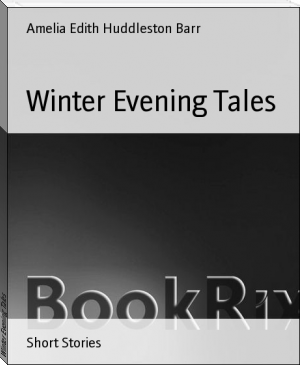Winter Evening Tales - Amelia Edith Huddleston Barr (pocket ebook reader .TXT) 📗

- Author: Amelia Edith Huddleston Barr
Book online «Winter Evening Tales - Amelia Edith Huddleston Barr (pocket ebook reader .TXT) 📗». Author Amelia Edith Huddleston Barr
That Joseph Livesey's youth was a hard and bitter one there is no doubt. The price of flour continued for years fabulously high; so much so that wealthy people generally pledged themselves to reduce their use of it one-third, and puddings or cakes were considered on any table, a sinful extravagance. When the government was offering large premiums to farmers for raising extra quantities and detailing soldiers to assist in threshing it, poor bankrupt spinners must have had a hard struggle for a bare existence.
Indeed, education was hardly thought possible, and, though Joseph managed, "by hook or crook," to learn how to read, write and count a little, it was through difficulties and discouragements that would have been fatal to any ordinary intelligence or will.
Until he was twenty-one years of age he worked patiently at his loom, which stood in one corner of a cellar, so cold and damp that its walls were constantly wet. But he was hopeful, and even in those dark days dared to fall in love. On attaining his majority, he received a legacy of L30. Then he married the poor girl who had made brighter his hard apprenticeship, and lived happily with her for fifty years.
But the troubles that had begun before his birth--and which did not lighten until after the passing of the Reform Bill, in June, 1832--had then attained a proportion which taxed the utmost energies of both private charities and the national government.
The year of Joseph Livesey's marriage saw the passage of the Corn Laws, and the first of those famous mass meetings in Peter's Field, near Manchester, which undoubtedly molded the future temper and status of the English weavers and spinners. From one of these meetings, the following year, thousands of starving men started en masse to London. They were followed by the military and brought back for punishment or died miserably on the road, though 500 of them reached Macclesfield and a smaller number Derby.
But Livesey, though probably suffering as keenly as others, joined no body of rioters. He borrowed a sovereign and bought two cheeses; then cutting them up into small lots, he retailed them on the streets, Saturday afternoons, when the men were released from work. The profit from this small investment exceeding what it was possible for him to make at his loom, he continued the trade, and from this small beginning founded a business, and made a fortune which has enabled him to devote a long life to public usefulness and benevolence.
But his little craft must have needed skillful piloting, for his family increased rapidly during the disastrous years between 1816 and 1832; so disastrous that in 1825-26 the Bank of England was obliged to authorize the Chamber of Commerce to make loans to individuals carrying on large works of from L500 to L10,000. Bankruptcies were enormous, trade was everywhere stagnant, L60,000 were subscribed for meal and peas to feed the starving, and the government issued 40,000 articles of clothing. The quarrels between masters and spinners were more and more bitter, mills were everywhere burnt, and at Ashton in one day 30,000 "hands" turned out.
During these dreadful years every thoughtful person had noticed how much misery and ill-will was caused by the constant thronging to public houses, and temperance societies had been at work among the angry men of the working classes. Joseph Livesey had been actively engaged in this work. But these first efforts of the temperance cause were directed entirely against spirits. The use of wine and ale was considered then a necessity of life. Brewing was in most families as regular and important a duty as baking; the youngest children had their mug of ale; and clergymen were spoken of without reproach as "one," "two" or "three-bottle men."
But Joseph Livesey soon became satisfied that these half measures were doing no good at all, and in 1831 a little circumstance decided him to take a stronger position. He had to go to Blackburn to see a person on business; and, as a matter of course, whiskey was put on the table. Livesey for the first time tasted it, and was very ill in consequence. He had then a large family of boys, and both for their sakes and that of others, he resolved to halt no longer between two opinions.
He spoke at once in all the temperance meetings of the folly of partial reforms, pointed out the hundreds of relapses, and urged upon the association the duty of absolute abstinence. His zeal warmed with his efforts and he insisted that in the matter of drinking "the golden mean" was the very sin for which the Laodicean Church had been cursed.
The disputes were very angry and bitter; far more so than we at this day can believe possible, unless we take into account the universal national habits and its poetic and domestic associations with every phase of English life. But he gradually gained adherents to his views though it was not until the following year he was able to take another step forward.
It was on Thursday, August 23, 1832, that the first solemn pledge of total abstinence was taken. That afternoon Joseph Livesey, pondering the matter in his mind, saw John King pass his shop. He asked him to come in and talk the subject over with him. Before they parted Livesey asked King if he would join him in a pledge to abstain forever from all liquors; and King said he would. Livesey then wrote out a form and, laying it before King, said: "Thee sign it first, lad." King signed it, Livesey followed him, and the two men clasped hands and stood pledged to one of the greatest works humanity has ever undertaken.
A special meeting was then called, and after a stormy debate, the main part of the audience left, a small number remaining to continue the argument. But the end of it was that seven men came forward and drew up and signed the following document, which is still preserved:
"We agree to abstain from all liquors of an intoxicating quality,
whether they be ale, porter, wine or ardent spirits, except as
medicine.
"JOHN GRATREX,
EDWARD DICKINSON,
JOHN BROADBENT,
JNO. SMITH,
JOSEPH LIVESEY,
DAVID ANDERTON,
JNO. KING."
All these reformers were virtually working men, though most of them rose to positions of respect and affluence. Still the humility of the origin of the movement was long a source of contempt, and its members, within my own recollection, had the stigma of vulgarity almost in right of their convictions.
But God takes hands with good men's efforts, and the cause prospered just where it was most needed--among the operatives and "the common people." One of these latter, a hawker of fish, called Richard Turner, stood, in a very amusing and unexpected way, sponsor for the society. Richard was fluent of speech, and, if his language was the broadest patois, it was, nevertheless, of the most convincing character. He always spoke well, and, if authorized words failed him, readily coined what he needed. One night while making a very fervent speech, he said: "No half-way measures here. Nothing but the te-te total will do."
Mr. Livesey at once seized the word, and, rising, proposed it as the name of the society. The proposition was received with enthusiastic cheering, and these "root and branch" temperance men were thenceforward known as teetotalers. Richard remained all his life a sturdy advocate of the cause, and when he died, in 1846, I made one of the hundreds and thousands that crowded the streets of the beautiful town of Preston and followed him to his grave. The stone above it chronicles shortly his name and death, and the fact that he was the author of a word known now wherever Christianity and civilization are known.
MARGARET SINCLAIR'S SILENT MONEY.
"It was ma luck, Sinclair, an' I couldna win by it."
"Ha'vers! It was David Vedder's whiskey that turned ma boat tapsalteerie, Geordie Twatt."
"Thou had better blame Hacon; he turned the boat Widdershins an' what fule doesna ken that it is evil luck to go contrarie to the sun?"
"It is waur luck to have a drunken, superstitious pilot. Twatt, that Norse blood i' thy veins is o'er full o' freets. Fear God, an' mind thy wark, an' thou needna speir o' the sun what gate to turn the boat."
"My Norse blood willna stand ony Scot stirring it up, Sinclair. I come o' a mighty kind--"
"Tush, man! Mules mak' an unco' full about their ancestors having been horses. It has come to this, Geordie: thou must be laird o' theesel' before I'll trust thee again with ony craft o' mine." Then Peter Sinclair lifted his papers, and, looking the discharged sailor steadily in the face, bid him "go on his penitentials an' think things o'er a bit."
Geordie Twatt went sullenly out, but Peter was rather pleased with himself; he believed that he had done his duty in a satisfactory manner. And if a man was in a good temper with himself, it was just the kind of even to increase his satisfaction. The gray old town of Kirkwall lay in supernatural glory, the wondrous beauty of the mellow gloaming blending with soft green and rosy-red spears of light that shot from east to west, or charged upward to the zenith. The great herring fleet outside the harbor was as motionless as "a painted fleet upon a painted ocean"--the men were sleeping or smoking upon the piers--not a foot fell upon the flagged streets, and the only murmur of sound was round the public fountains, where a few women were perched on the bowl's edge, knitting and gossiping.
Peter Sinclair was, perhaps, not a man inclined to analyze such things, but they had their influence over him; for, as he drifted slowly home in his skiff, he began to pity Geordie's four motherless babies, and to wonder if he had been as patient with him as he might have been. "An' yet," he murmured, "there's the loss on the goods, an' the loss o' time, and the boat to steek afresh forbye the danger to life! Na, na, I'm no called upon to put life i' peril for a glass o' whiskey."
Then he lifted his head, and there, on the white sands, stood his daughter Margaret. He was conscious of a great thrill of pride as he looked at her, for Margaret Sinclair, even among the beautiful women of the Orcades, was most beautiful of all. In a few minutes he had fastened his skiff at a little jetty, and was walking with her over the springy heath toward a very pretty house of white stone. It was his own house, and he was proud of it also, but not half so proud of the house as of its tiny garden; for there, with great care and at great cost, he had managed to rear a few pansies, snowdrops, lilies of the valley, and other hardy English flowers. Margaret and he stooped lovingly over them, and it was wonderful to see how Peter's face softened, and how gently the great rough hands, that had been all day handling smoked geese and fish, touched these frail, trembling blossoms.
"Eh, lassie! I could most greet wi' joy to see the bonnie bit things; when I can get time I'se e'en go wi' thee to Edinburgh; I'd like weel to see such fields an' gardens an' trees as I hear thee tell on."
Then Margaret began again to describe the greenhouses, the meadows and wheat fields, the forests





Comments (0)